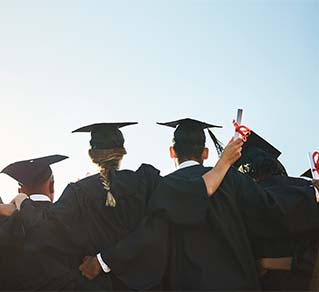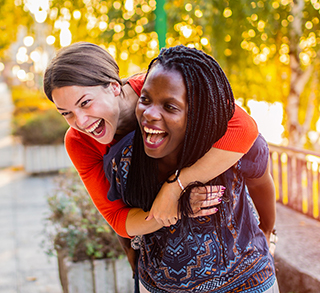By Zahra Hassan Doualeh, 2023-24 McCall MacBain International Fellow in Seoul, South Korea
I never expected a move across the world to come easy, without any hurdles along the way. However, the challenges I faced were far from being what I expected. Coming from a close-knit community, I did not consider how loneliness would creep up on me after moving to a city home to nearly 10 million people.
 Looking back on the first few months of the fellowship, I recognize the crucial role a community plays in one’s experience abroad. Every day, I woke up promising myself that I would try to talk to at least one new person. Pushing myself out of my comfort zone until it expanded. I made conversation with shopkeepers, went to cultural events alone, went up to the young people at the local mosque, and joined expat groups on social media, all in an attempt to make meaningful connections.Bit by bit, I saw my social circle grow. Three months in, I can confidently say that I not only have friends but a community made up of mentors, teachers, and peers who continually enrich my daily life here in South Korea. I am grateful for the amazing people I met doing my volunteering work who took me under their wing and cared for me from the very beginning. Retroactively, I see how drastically different things could have turned out had I not been surrounded by people willing to go the extra mile to ensure I got home safe at the end of the night or had medicine whenever I fell ill.
Looking back on the first few months of the fellowship, I recognize the crucial role a community plays in one’s experience abroad. Every day, I woke up promising myself that I would try to talk to at least one new person. Pushing myself out of my comfort zone until it expanded. I made conversation with shopkeepers, went to cultural events alone, went up to the young people at the local mosque, and joined expat groups on social media, all in an attempt to make meaningful connections.Bit by bit, I saw my social circle grow. Three months in, I can confidently say that I not only have friends but a community made up of mentors, teachers, and peers who continually enrich my daily life here in South Korea. I am grateful for the amazing people I met doing my volunteering work who took me under their wing and cared for me from the very beginning. Retroactively, I see how drastically different things could have turned out had I not been surrounded by people willing to go the extra mile to ensure I got home safe at the end of the night or had medicine whenever I fell ill.
 South Korea is a very particular country in the sense that it is a high-context society. Prior knowledge of its history, culture, and colonial past are all factors that affect daily interactions, whether it be reflected in speech or street names. Thankfully, prior research and friends who were native speakers helped me navigate the cultural intricacies. This reinforced my idea that one cannot learn a language separately from the society it evolves in. Rather, language learning must be done through a holistic approach. History, culture and religion must be studied in parallel to language and cannot be disassociated from it.
South Korea is a very particular country in the sense that it is a high-context society. Prior knowledge of its history, culture, and colonial past are all factors that affect daily interactions, whether it be reflected in speech or street names. Thankfully, prior research and friends who were native speakers helped me navigate the cultural intricacies. This reinforced my idea that one cannot learn a language separately from the society it evolves in. Rather, language learning must be done through a holistic approach. History, culture and religion must be studied in parallel to language and cannot be disassociated from it.
My favourite thing about Seoul so far has been its polyvalence. As the nation’s capital, it holds a lot of historical meaning as it is the political, economic and cultural epicentre of South Korea. This is reflected through the architecture; the former Japanese general government building dating from the colonial juxtaposes palaces from the Joseon dynasty. The city is simultaneously characterized as being a cultural hub for the thousands of students who attend one of the several universities.
I have had the opportunity to participate in cheering events, attend sports competitions and get a sneak peek into what student life is like here. Despite its many attributes, I recognize the importance of leaving the city to experience South Korea from the eyes of the average Korean. Indeed, the fast-paced environment is not exactly the best suited to showcase the warmth and kindness of Korean people. Exploring smaller nearby towns showed me the extent of people’s friendliness and good nature. Despite the obvious language barrier, I have encountered many kind and welcoming strangers going out of their way to introduce me customs and traditions, and these experiences were truly impactful.











